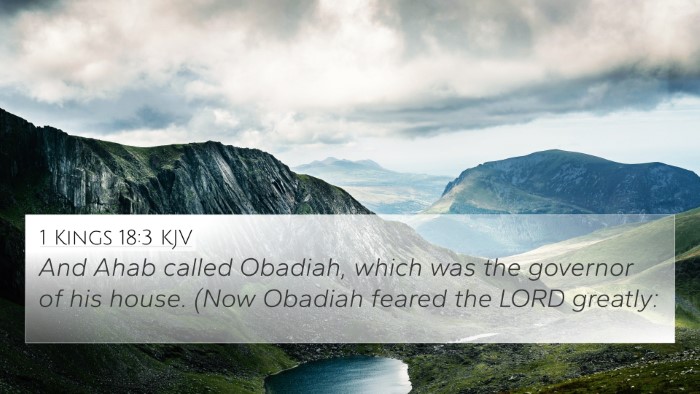Understanding 1 Kings 18:8
1 Kings 18:8 states, "And he answered him, I am: go, tell thy lord, Behold, Elijah is here." This verse encapsulates a significant moment in the narrative, marked by the prophetic authority of Elijah and the looming confrontation with King Ahab.
Contextual Analysis
This verse occurs during a time of great tension in Israel, where Elijah is called upon to address the idolatry of the people and the wickedness of their king. The statement is made during the historical episode of Elijah's encounter with Obadiah, Ahab's servant, who is searching for water amidst a severe drought.
Commentary Insights
- Matthew Henry: He emphasizes Elijah's boldness and divine mission. Henry notes that Elijah's presence is an indication of God's providential care, and that Elijah represents a stark contrast to the apostasy of Israel.
- Albert Barnes: Barnes highlights the reluctance evidenced by Obadiah, portraying a fear of the king's wrath. He discusses how Elijah's reply signifies his unwavering commitment to God's message and the tasks ahead.
- Adam Clarke: Clarke points out that Elijah's assertive proclamation serves as a prelude to the confrontation with Ahab, and he delves into the prophetic significance of Elijah's role in Israel's history.
Thematic Connections
This verse connects strongly to themes of obedience, prophecy, and divine revelation. Elijah's declaration is not merely about his presence but about the mission he is tasked with from God.
Cross-References
The meaning of 1 Kings 18:8 can be enriched through various cross-references:
- 1 Kings 17:1: Elijah's title, "the Tishbite," and his role as a prophet.
- 1 Kings 18:1: God's command to Elijah to present himself before Ahab.
- 2 Kings 1:1: Contextualizes the ongoing tension between Elijah and the monarchy.
- James 5:17: Highlights Elijah's fervent prayers and their effectiveness.
- Malachi 4:5-6: Refers to Elijah's prophetic role in the end times.
- Luke 4:25-27: Jesus refers to Elijah in the context of God's favor beyond Israel.
- Matthew 17:10-13: Discusses the expectation of Elijah’s coming.
Inter-Biblical Dialogue
The presence of Elijah in 1 Kings not only serves as a singular moment but initiates a deeper conversation throughout Scripture, signifying the constant struggle against idolatry and the prophetic call to return to righteousness.
Conclusion
1 Kings 18:8 stands as a powerful assertion of faith and responsibility. It encapsulates the essence of prophetic duty amidst a corrupt society, echoing through time as a call for believers to stand firm in their faith and mission, even in the face of adversity.
Additional Insights
The verse invites believers to consider the role of prophets in their own lives and to reflect on the messages that God might be delivering through contemporary figures.





